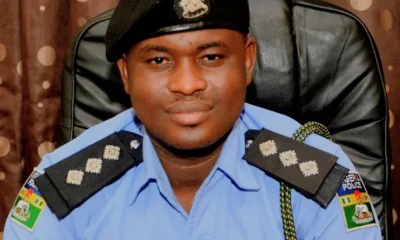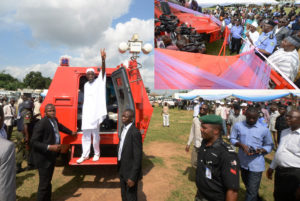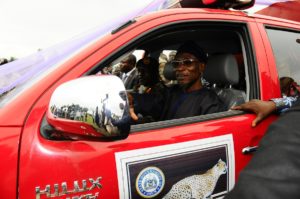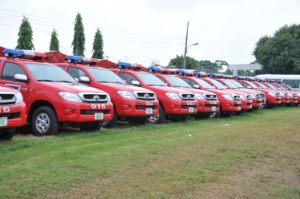News
Osun Security: Another First In Rating Indices By Abiodun Komolafe

State of Osun is Nigeria’s most peaceful state. This impressive feat, according to a report on Nigeria Peace Index (NPI), couldn’t have come at a more auspicious time than now in the sense that Nigeria is bogged down by serious internal security challenge on all fronts: provable Boko Haram and ‘ISIS in West Africa’ terrorism in the North East; violent herdsmen/farmers clashes in the North West and North Central; armed banditry and kidnappings and in the South East, militancy and piracy in the South South; and violent crimes and ethno-religious upheavals in parts of the South West geo-political zones of the country.
Gratifyingly, the ranking, based on the research findings of the Foundation for Peace Professionals (FPP), came less than a month after the Joint Tax Board (JTB) commended the Rauf Aregbesola-led administration for spearheading a process that has consistently led to a year-on-year improvement in Internally Generated Revenue (IGR) and tax remittances to the state, the latest being the N11.9 billion generated as actual full year IGR for 2017, representing more than 30% increase over the previous year’s N8,884,756,040.35. The award could also be described as a soothing balm for a country that has just been treated one of the cruelest forms of armed robbery attacks in its recent history. The incident, which took place in Offa in a neighboring state, left no fewer than 17 persons dead and a large amount of money carted away by the bandits.
Yes! This is not the first time the state will be so honoured! Remember: Osun ranked Nigeria’s 13th crime-free state in 2016, a height attained “through various interventions by the government in beefing up the security of the state.” It is even more than that! Osun is, as we speak, Nigeria’s 2nd richest state. Currently, it is 2nd on the Human Capital Index and has maintained the 2nd position in four years in a roll in the global Multidimensional Poverty Index (MPI). In Agriculture and Food Security, dear state is now 2nd only to Oyo State in broiler production and its forestry sub-sector ranks 5th in the country.
Osun is now Nigeria’s 5th largest economy with its GDP growing at 7.3% per annum. Its position (between 1st and 3rd, since 2013) in the Joint Admissions and Matriculations Board (JAMB) matriculable students in Nigeria has not only rubbished the premise that “WAEC rankings” of states should be the only yardstick for measuring states’ performance in education, it has also gone a long way in demonstrating that government’s transformational investments in the education sector have not been in vain. In Sports, the state also came 9th in the recently-concluded National Youth Games, a feat that has for a long while eluded the state.
For the sake of clarity so as not to be left in the ambience of ambiguity, this government is reputed to be the first in the country to have led a new understanding in parliamentary Local Government administration in Nigeria. It is also the first in the country to replace books with computer tablets called ‘Tablet of Knowledge’ aka ‘Opon Imo’ to further stimulate the interest of students to learning as well as completely turn learning into play in schools. While other states were wallowing in the cesspool of salary conundrum, courtesy of the national economic dislocation, Aregbesola’s government became the first in the country to creatively adopt a robustly-designed salary apportionment model which “makes workers from grade level 08 and above collect between 75 and 50 per cent of their salaries.”
However, while its ranking as the state with the highest prevalence of female genital mutilation in Nigeria, courtesy of the United Nations Population Fund (UNFPA), demands the attention of all, facts are that Aregbesola’s parliamentary gift to Osun will in no small way help in expanding the potentials for accountability, transparency and societal capacity building.
Though by no means a great feat, Aregbesola’s administration’s latest cap did not come as a surprise. Certainly, it is one of the expected results of his administration’s renewed efforts at fostering, especially, a secured, virtuous state. Prior to his assumption of office on November 27, 2010, Osun was home to all kinds of security challenges which no doubt compromised the people’s lives and diminished their influence. Though sitting on a sea of possibilities, the state was broke, with its IGR at the time standing at a paltry N300 million monthly average. Put in strict terms, Aregbesola took over the reins of power when the state was in an economic dilemma as a result of structural deficiency, gross misrule and mismanagement of resources.
Aregbesola became governor and the narrative changed! Without being sycophantic, Ogbeni’s commitment to security of lives and property remains unimpeachable as he has consistently maintained that no state, not even country, can reach its full potentials in an atmosphere of violence and insecurity. It was against this backdrop that government set up the Swift Action Squad (SAS) as a dedicated a crime response team to compliment the efforts of the regular police in securing the state. It also procured and distributed 125 security patrol vehicles and 25 Armoured Personnel Carriers (APCs), in addition to provision of other logistics, to security agencies in the state for the purpose of ensuring peace and communal harmony in the state. Vigilance and neighborhood watch groups were also encouraged to provide support for the regular security agencies.
Another area that demands commendation was the administration’s fostering a “co-existence blueprint” in resolving herders/farmers crises in Osun, a situation the Sale Bayari-led Gan Allah Fulani Development Association of Nigeria (GAFDAN) said has been responsible for a “silent and peaceful” state.
Talking about Aregbesola’s administration in the eye of history, this, again, is why Nigeria’s tribe of Pharisees who always hunger for the wrong reason needs to wake up from its hatred-infused slumber. Rather than engage in needless spleen-venting or muscle-flexing wiles that takes nobody nowhere, present challenges should unite actors in the Osun political landscape to look beyond political sentiments and needless emotions in the choice of Aregbesola’s successor. Jokes apart, one pathetic paradox of what Kingsley Moghalu referred to as ‘politics of vested interests’ in this clime is that, in spite of all that Nigeria has been blessed with as a country, she’s still rated as the poverty capital of the world, with more than 80 million Nigerians now live below poverty level and over-3.7 million currently faced with food insecurity which, if care is not taken, may increase to 5.2 million by August 2018. Nigeria, interestingly, Africa’s most populous country and largest economy, is now world’s 125th poorest country. The sad side of it is that, of the world’s poorest countries, 18 of them are in Africa; and, Mauritius, which currently serves as Africa’s best, is world’s 45th.
Less than 3 years of President Muhammadu Buhari’s government, Nigeria’s external debt, already considered as the biggest in all of sub-Saharan Africa, now stands at over-$18.91 billion (over-N5.787 trillion). And, as if difficulties are gender-sensitive, Nigeria currently ranks worst in women’s participation in politics, courtesy of Nigeria’s unhealthy political environment. On the World Happiness Index, she is 91st. In Industrial Gross Domestic Product (GDP), she has the lowest on the continent, beaten by less-endowed countries like Côte d’Ivoire, Ethiopia, Cameroon and Ghana. In Budget transparency, she is world’s 90th; and 23rd in Africa behind Rwanda, Zimbabwe and Liberia. Even, the best university in Nigeria can only fit into 1099th position globally. To make a bad situation worse, Nigerians, according to International Monetary Fund (IMF), are now poorer than they were three years ago!
Without being immodest, Nigeria is in troubled times and Osun as an integral part of the country is not immune from her many predicaments. According to information, 34 states can’t pay workers’ salaries without running, cap-in-hand, to Abuja for monthly handouts. The trials being faced by Nigeria’s crude oil in the international market are yet to abate even as dear country is yet to smart out of its mono-economy status. It’s in the midst of these threats that the incoming governor will be expected consolidate on Aregbesola’s achievements, win the confidence of his people, improve on the payment of workers’ salaries and perform wonders along the line of infrastructure development.
Looking at Nigeria’s current political and socio-economic dynamics therefore, those who truly love Osun will have to do more than debating, counter-debating and panting with polluted affinity on the colour or size of the next governor’s ethno-religious garb. In my considered opinion, Aregbesola’s successor must be a personality who has all along been partaking of the many surgical operations aimed at healing the wounds created by the enormity of its challenges. Failure to incorporate this into the DNA of our choice process may be likened to deliberately preparing dear state for doom. God forbid!
May the Lamb of God, who takes away the sins of the world, grant us peace in the State of Osun!
*KOMOLAFE writes in from Ijebu-Jesa, Osun State, Nigeria (ijebujesa@yahoo.co.uk)
abiodunKOMOLAFE,
O20, Okenisa Street,
PO Box 153,
Ijebu-Jesa, State of Osun.
-

 News4 days ago
News4 days agoInsecurity: Kogi Schools Resume On Monday
-

 Opinion4 days ago
Opinion4 days agoDon’t Pull the Plug: Why Nigerians Are Pleading for the U.S. to Extend Its Police Training Program — and Why It Must Synergize With New Military Arrivals
-

 Crime3 days ago
Crime3 days agoVigilante Reportedly Shoots Colleague Dead In Plateau
-

 Crime5 days ago
Crime5 days agoPolice Arrest Two Over Murder Of 62-Year-Old Woman In Oyo





